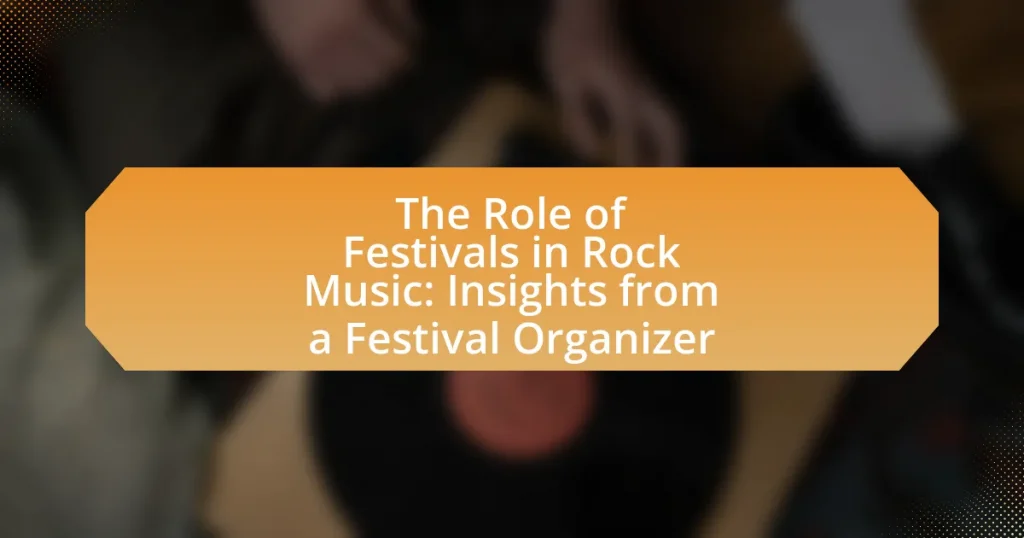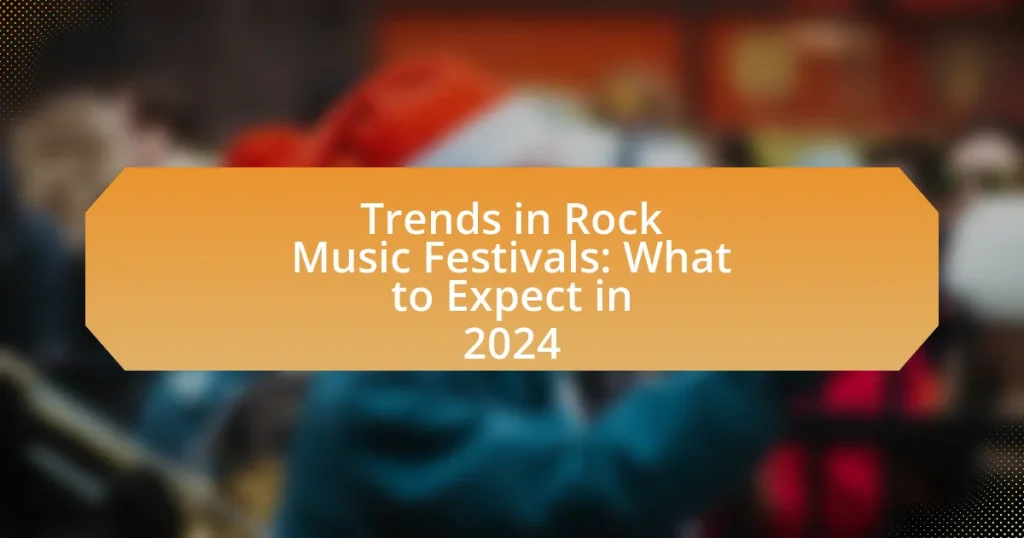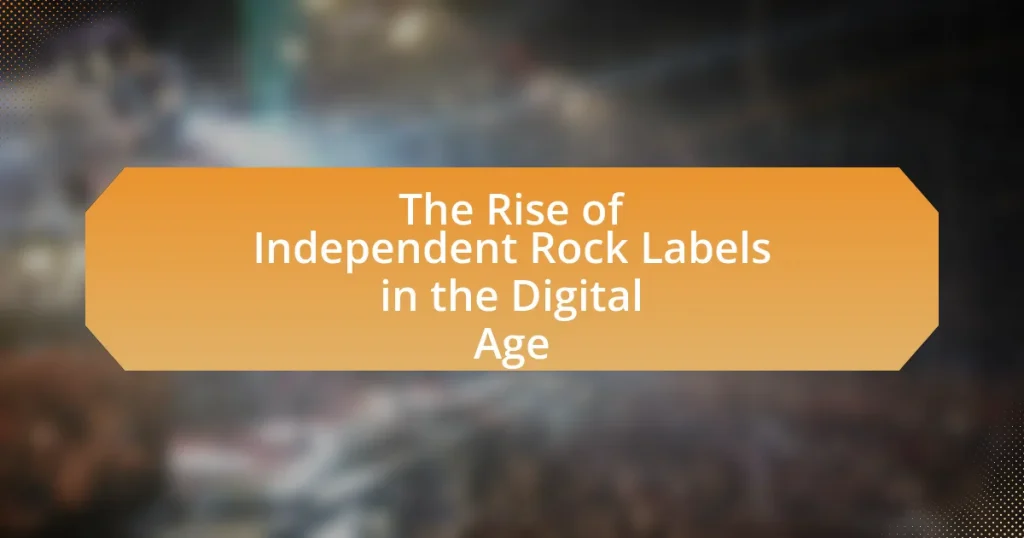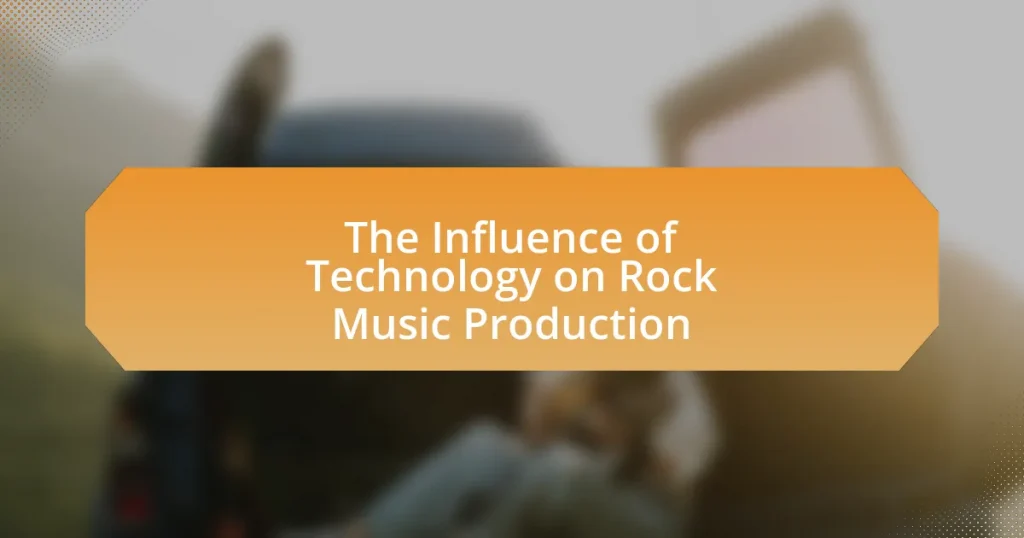The article examines the significant role of festivals in the rock music genre, highlighting their impact on artist exposure, community engagement, and cultural significance. It traces the historical roots of rock festivals from the 1960s, particularly the iconic Woodstock Festival, and discusses how events like Coachella and Glastonbury have evolved to shape the modern music landscape. Key insights include the importance of festivals for emerging and established artists, the logistical challenges faced by organizers, and the trends influencing the future of rock music festivals, such as technology integration and sustainability practices. Additionally, the article outlines best practices for aspiring festival organizers and the essential partnerships needed for successful event execution.
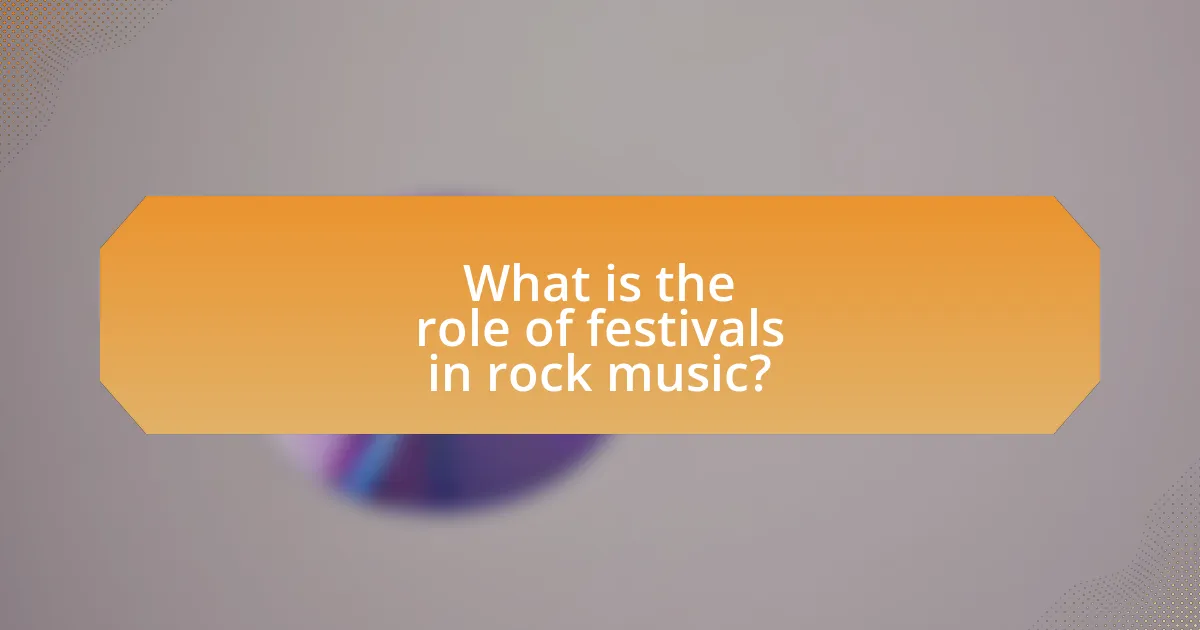
What is the role of festivals in rock music?
Festivals play a crucial role in rock music by serving as platforms for artists to showcase their work, connect with fans, and foster community engagement. These events often feature multiple bands and genres, creating a diverse musical experience that attracts large audiences. For instance, major festivals like Coachella and Glastonbury have historically launched the careers of numerous rock bands, providing them with significant exposure and opportunities for growth. Additionally, festivals contribute to the cultural landscape by promoting collaboration among artists and enhancing the overall visibility of the rock genre within the music industry.
How do festivals influence the rock music scene?
Festivals significantly influence the rock music scene by providing a platform for exposure, collaboration, and community engagement among artists and fans. These events often showcase a diverse lineup of both established and emerging rock bands, allowing lesser-known artists to gain visibility and potentially build a following. For instance, festivals like Coachella and Glastonbury have historically launched the careers of numerous rock musicians by featuring them alongside well-known acts, thus enhancing their credibility and reach. Additionally, festivals foster a sense of community among fans, creating shared experiences that strengthen the rock music culture and encourage attendance at live performances throughout the year.
What are the historical roots of rock music festivals?
The historical roots of rock music festivals can be traced back to the 1960s, particularly with the iconic Woodstock Festival in 1969, which symbolized the counterculture movement and brought together diverse musical acts. This festival set a precedent for large-scale gatherings focused on rock music, emphasizing themes of peace, love, and social change. Prior to Woodstock, smaller events like the Monterey Pop Festival in 1967 showcased rock artists and helped establish the festival format, combining music with cultural and political statements. These early festivals laid the groundwork for the modern rock festival scene, influencing the organization and experience of subsequent events.
How have festivals evolved in the rock genre over time?
Festivals in the rock genre have evolved significantly from the 1960s to the present day, transitioning from small, localized events to large-scale international gatherings. Initially, festivals like Woodstock in 1969 showcased a handful of iconic bands and emphasized counterculture and community. Over time, the emergence of major festivals such as Coachella and Glastonbury in the 1990s and 2000s introduced diverse lineups, incorporating various genres and attracting larger audiences, with attendance figures reaching over 100,000. Additionally, advancements in technology and social media have transformed marketing strategies and audience engagement, allowing festivals to reach global audiences and enhance the overall experience through live streaming and interactive platforms. This evolution reflects broader changes in the music industry and audience expectations, highlighting the growing importance of festivals as cultural phenomena in the rock genre.
Why are festivals important for rock artists?
Festivals are important for rock artists because they provide a platform for exposure, networking, and revenue generation. Rock artists can reach large audiences at festivals, often performing in front of thousands, which enhances their visibility and fan base. For instance, major festivals like Coachella and Glastonbury attract significant media attention, allowing artists to gain recognition beyond their local scenes. Additionally, festivals facilitate connections with industry professionals, including promoters and other musicians, which can lead to future collaborations and opportunities. Financially, festivals often offer artists guaranteed payments and merchandise sales, contributing to their overall income.
What opportunities do festivals provide for emerging rock bands?
Festivals provide emerging rock bands with significant opportunities for exposure, networking, and performance experience. By performing at festivals, these bands can reach larger audiences, often consisting of music enthusiasts and industry professionals, which can lead to increased fan engagement and potential bookings. Additionally, festivals often feature a diverse lineup, allowing emerging bands to connect with established artists and other musicians, fostering collaborations and mentorship opportunities. According to a report by the UK Music Industry, festivals contribute to over £4 billion to the UK economy, highlighting their importance as platforms for new talent to gain visibility and credibility in the competitive music landscape.
How do festivals impact the careers of established rock musicians?
Festivals significantly enhance the careers of established rock musicians by providing a platform for exposure, networking, and revenue generation. These large-scale events attract diverse audiences, allowing musicians to reach new fans and reinforce their existing fan base. For instance, performances at renowned festivals like Coachella or Glastonbury can lead to increased album sales and streaming numbers, as evidenced by a 2019 study from the University of Southern California, which found that artists performing at major festivals experienced a 30% increase in digital sales post-event. Additionally, festivals facilitate connections with industry professionals, leading to potential collaborations and future performance opportunities, thereby solidifying the musicians’ presence in the competitive music landscape.
What cultural significance do rock music festivals hold?
Rock music festivals hold significant cultural importance as they serve as communal spaces for expression, identity, and social connection among diverse audiences. These festivals foster a sense of belonging and community, often bringing together individuals from various backgrounds who share a passion for music. Historically, events like Woodstock in 1969 exemplified this cultural significance by promoting peace, love, and countercultural movements, influencing societal attitudes and music trends. Additionally, rock music festivals often highlight social issues, with artists using their platforms to advocate for change, thereby reinforcing the role of music as a catalyst for cultural dialogue and activism.
How do festivals foster community among rock music fans?
Festivals foster community among rock music fans by creating shared experiences that unite individuals through music, culture, and social interaction. These events provide a platform for fans to connect over their mutual love for rock music, often leading to friendships and a sense of belonging. For instance, festivals like Glastonbury and Coachella attract thousands of attendees who engage in communal activities such as singing, dancing, and celebrating together, reinforcing social bonds. Additionally, the presence of diverse lineups and interactive spaces encourages fans to meet others with similar interests, further enhancing community ties. Studies have shown that participation in music festivals can lead to increased social cohesion and a stronger sense of identity among attendees, highlighting the role of these events in fostering a vibrant rock music community.
What role do festivals play in promoting diversity in rock music?
Festivals play a crucial role in promoting diversity in rock music by providing a platform for a wide range of artists from various backgrounds to showcase their talents. These events often feature diverse lineups that include musicians of different ethnicities, genders, and musical styles, which helps to challenge the traditional norms of the rock genre. For instance, festivals like Glastonbury and Coachella have made concerted efforts to include underrepresented artists, thereby fostering an inclusive environment that encourages collaboration and cross-genre experimentation. This diversity not only enriches the festival experience for attendees but also broadens the audience for these artists, ultimately contributing to a more varied and representative rock music landscape.
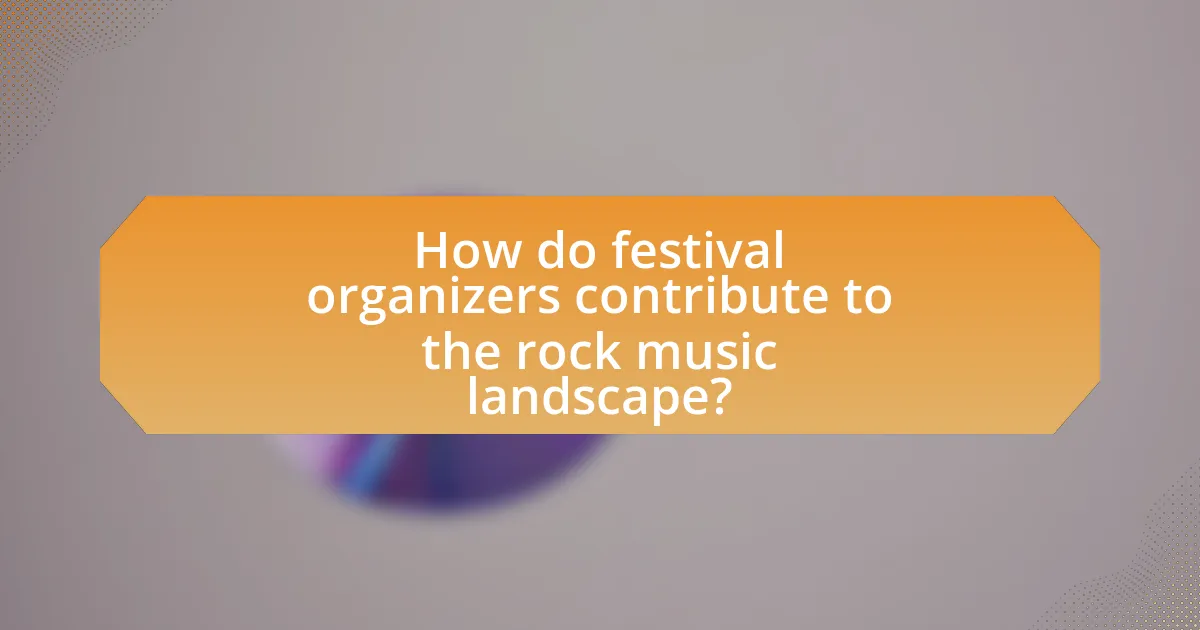
How do festival organizers contribute to the rock music landscape?
Festival organizers significantly shape the rock music landscape by curating lineups that highlight both established and emerging artists, thereby influencing public taste and trends. They create platforms for diverse musical expressions, allowing new talent to gain exposure alongside well-known acts, which fosters innovation within the genre. For instance, festivals like Coachella and Glastonbury have historically introduced audiences to groundbreaking rock bands, contributing to their rise in popularity. Additionally, organizers facilitate community engagement and cultural exchange, enhancing the overall experience of rock music through immersive environments and interactive activities. This multifaceted contribution not only sustains the genre’s relevance but also drives its evolution in response to changing audience preferences.
What are the key responsibilities of a festival organizer?
The key responsibilities of a festival organizer include planning, coordinating, and executing all aspects of the festival. This involves selecting the venue, managing budgets, securing permits, and booking artists and vendors. Additionally, festival organizers are responsible for marketing the event, ensuring safety and compliance with regulations, and overseeing logistics such as staffing and equipment rental. These responsibilities are critical for the successful execution of a festival, as they directly impact attendee experience and operational efficiency.
How do organizers select artists for rock music festivals?
Organizers select artists for rock music festivals based on a combination of factors including genre relevance, audience appeal, and market trends. They typically analyze the current music landscape to identify popular and emerging artists that align with the festival’s theme and target demographic. Additionally, organizers consider the artists’ previous performance history, fan engagement, and social media presence to gauge their potential draw. For instance, festivals like Coachella and Lollapalooza often feature a mix of established headliners and up-and-coming acts to create a diverse lineup that attracts a wide audience. This strategic selection process is crucial for maximizing ticket sales and enhancing the overall festival experience.
What logistical challenges do festival organizers face?
Festival organizers face numerous logistical challenges, including site selection, crowd management, and vendor coordination. Site selection involves finding a location that can accommodate the expected audience while meeting safety regulations and accessibility standards. Crowd management is crucial for ensuring the safety of attendees, requiring effective planning for entry and exit points, as well as emergency response protocols. Vendor coordination entails managing food, merchandise, and service providers to ensure they meet the festival’s standards and timelines. These challenges are compounded by factors such as weather unpredictability and the need for effective communication among all stakeholders involved in the event.
How do organizers enhance the festival experience for attendees?
Organizers enhance the festival experience for attendees by curating diverse lineups, ensuring high-quality production, and providing engaging activities. By selecting a mix of well-known and emerging artists, organizers cater to various musical tastes, which increases attendee satisfaction. High-quality production, including sound, lighting, and stage design, creates an immersive atmosphere that elevates performances. Additionally, organizers often incorporate interactive elements such as workshops, art installations, and food vendors, which enrich the overall experience and foster community engagement. These strategies are supported by studies indicating that diverse programming and quality production significantly contribute to positive attendee experiences at music festivals.
What strategies do organizers use to engage festival-goers?
Organizers engage festival-goers through interactive experiences, targeted marketing, and community involvement. Interactive experiences include activities such as workshops, meet-and-greets with artists, and immersive installations that encourage participation. Targeted marketing utilizes social media campaigns and personalized communication to attract specific demographics, enhancing the likelihood of attendance. Community involvement fosters a sense of belonging by collaborating with local businesses and artists, which strengthens ties and encourages local attendance. These strategies are supported by studies showing that festivals with high levels of interactivity and community engagement report increased attendee satisfaction and loyalty.
How do organizers ensure safety and security at rock festivals?
Organizers ensure safety and security at rock festivals by implementing comprehensive planning and coordination strategies. These strategies include hiring professional security personnel, conducting thorough risk assessments, and establishing emergency response plans. For instance, many festivals employ trained security teams that monitor crowds and manage entry points to prevent unauthorized access. Additionally, organizers often collaborate with local law enforcement and emergency services to ensure rapid response capabilities in case of incidents. Historical data shows that festivals with robust security measures, such as the Glastonbury Festival, report significantly lower incidents of violence and safety breaches, highlighting the effectiveness of these practices.
What trends are shaping the future of rock music festivals?
The future of rock music festivals is being shaped by several key trends, including the integration of technology, a focus on sustainability, and the diversification of lineups. Technology is enhancing the festival experience through virtual reality, live streaming, and mobile apps that improve attendee engagement and accessibility. Sustainability is becoming a priority, with festivals adopting eco-friendly practices such as waste reduction and renewable energy sources, reflecting a growing awareness of environmental issues among audiences. Additionally, the diversification of lineups is evident as festivals increasingly feature a mix of genres and emerging artists, catering to a broader audience and fostering inclusivity. These trends are supported by industry reports indicating that festivals prioritizing sustainability and technological innovation see higher attendance and engagement rates.
How is technology influencing festival organization and experience?
Technology is significantly influencing festival organization and experience by enhancing operational efficiency and improving attendee engagement. For instance, event management software streamlines logistics such as ticketing, scheduling, and vendor coordination, allowing organizers to manage large-scale events more effectively. Additionally, mobile apps provide real-time updates, interactive maps, and personalized schedules for attendees, which enhances their overall experience. According to a report by Eventbrite, 70% of festival-goers prefer using mobile apps for information and engagement during events, demonstrating the impact of technology on attendee satisfaction.
What sustainability practices are being adopted by festival organizers?
Festival organizers are adopting various sustainability practices, including waste reduction, renewable energy use, and sustainable transportation options. For instance, many festivals implement comprehensive recycling and composting programs to minimize landfill waste, with some achieving over 90% waste diversion rates. Additionally, organizers are increasingly utilizing solar panels and wind turbines to power festival operations, reducing reliance on fossil fuels. Furthermore, initiatives such as encouraging public transport, carpooling, and providing bike parking promote eco-friendly travel to and from events. These practices not only lessen environmental impact but also enhance the overall experience for attendees who value sustainability.
What insights can be gained from a festival organizer’s perspective?
A festival organizer’s perspective provides insights into logistical planning, audience engagement, and artist management. Organizers must navigate complex logistics, including site selection, vendor coordination, and safety protocols, which are crucial for a successful event. Additionally, understanding audience preferences and trends allows organizers to curate lineups that resonate with attendees, enhancing overall satisfaction and attendance rates. For example, data from the 2022 Coachella festival indicated that diverse lineups increased ticket sales by 15% compared to previous years. Furthermore, effective artist management ensures that performers are satisfied, which can lead to positive word-of-mouth and repeat participation in future festivals. These insights highlight the multifaceted role of festival organizers in shaping the success of rock music festivals.
What lessons can be learned from successful rock music festivals?
Successful rock music festivals demonstrate the importance of effective planning, audience engagement, and artist collaboration. Effective planning involves logistical coordination, such as securing permits, managing schedules, and ensuring safety protocols, which are crucial for a smooth event. Audience engagement is enhanced through interactive experiences, such as meet-and-greets and social media integration, which foster a sense of community and loyalty among attendees. Artist collaboration is vital, as successful festivals often feature diverse lineups that appeal to various demographics, maximizing attendance and enhancing the overall experience. For instance, the Coachella Valley Music and Arts Festival has consistently attracted large crowds by curating a mix of established and emerging artists, showcasing the effectiveness of this approach.
How do successful festivals adapt to changing audience preferences?
Successful festivals adapt to changing audience preferences by actively engaging with their attendees through surveys, social media interactions, and data analysis to understand evolving tastes. For instance, festivals like Coachella and Glastonbury regularly update their lineups based on audience feedback and emerging music trends, ensuring they feature popular artists and genres that resonate with their target demographic. Additionally, they incorporate diverse experiences such as food options, art installations, and wellness activities, which reflect current lifestyle trends and enhance overall attendee satisfaction. This adaptability is supported by industry reports indicating that festivals that prioritize audience engagement see higher attendance and loyalty rates.
What common pitfalls do festival organizers encounter?
Festival organizers commonly encounter pitfalls such as inadequate budgeting, poor planning, and insufficient communication. Inadequate budgeting can lead to financial shortfalls, as many organizers underestimate costs related to permits, staffing, and logistics. Poor planning often results in scheduling conflicts and logistical challenges, which can disrupt the event flow. Insufficient communication among team members and stakeholders can create misunderstandings and operational inefficiencies, ultimately affecting the festival’s success. These pitfalls are frequently cited in industry reports, highlighting the importance of thorough preparation and clear communication in festival management.
What best practices should aspiring festival organizers consider?
Aspiring festival organizers should prioritize thorough planning, effective budgeting, and strong community engagement. Thorough planning involves creating a detailed timeline and checklist to ensure all aspects of the festival are addressed, from permits to logistics. Effective budgeting requires a clear understanding of costs, including venue, talent, and marketing, to avoid financial pitfalls; for instance, a study by the Eventbrite team found that 60% of event organizers cite budgeting as a major challenge. Strong community engagement fosters local support and can enhance attendance; research indicates that festivals with community involvement see a 30% increase in local participation.
How can new organizers effectively market their rock festivals?
New organizers can effectively market their rock festivals by leveraging social media platforms, engaging local communities, and collaborating with influencers. Social media allows for targeted advertising and real-time engagement with potential attendees, which is crucial for building excitement and awareness. Engaging local communities through partnerships with local businesses and organizations can enhance visibility and foster a supportive environment. Collaborating with influencers who resonate with the rock music audience can amplify reach and credibility, as studies show that influencer marketing can yield a return on investment of up to $6.50 for every dollar spent.
What partnerships are essential for a successful rock music festival?
Essential partnerships for a successful rock music festival include collaborations with local government, sponsors, vendors, and artists. Local government partnerships are crucial for securing permits, ensuring safety regulations, and facilitating community support. Sponsorships provide financial backing and marketing reach, which are vital for promoting the festival and attracting attendees. Vendor partnerships are necessary for food, merchandise, and services, enhancing the overall festival experience. Finally, partnerships with artists and their management ensure a diverse lineup that appeals to the target audience, driving ticket sales and engagement. These partnerships collectively contribute to the logistical, financial, and experiential success of the festival.
What practical tips can enhance the festival experience for attendees?
To enhance the festival experience for attendees, it is essential to prioritize planning and preparation. Attendees should arrive early to secure optimal viewing spots and familiarize themselves with the festival layout, which can reduce stress and improve enjoyment. Additionally, staying hydrated and bringing portable snacks can help maintain energy levels throughout the event. According to a study by the Event Marketing Institute, 78% of festival-goers reported that having access to food and drink options significantly improved their overall experience. Furthermore, utilizing festival apps for schedules and maps can streamline navigation and ensure attendees do not miss key performances.
